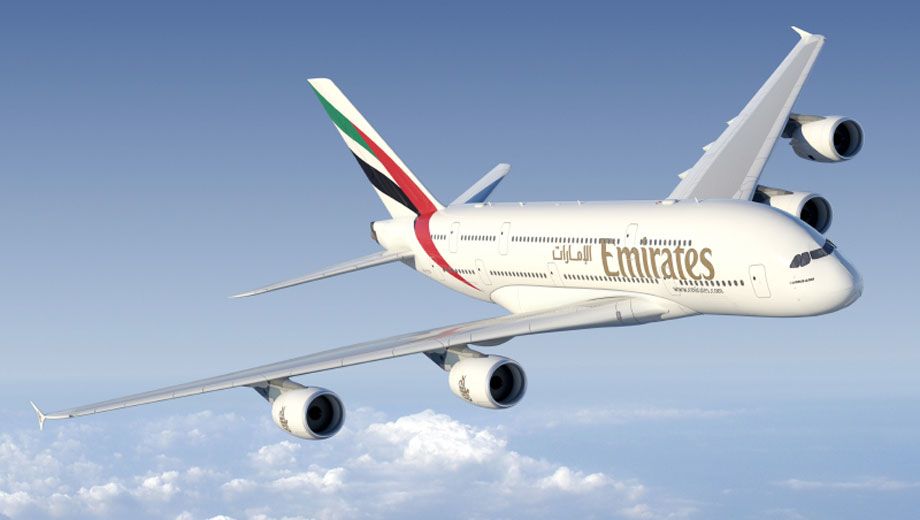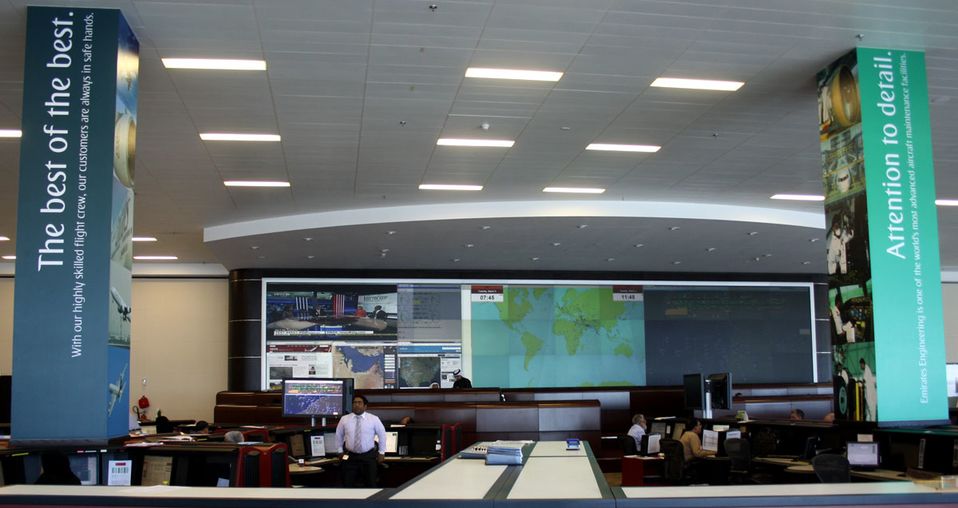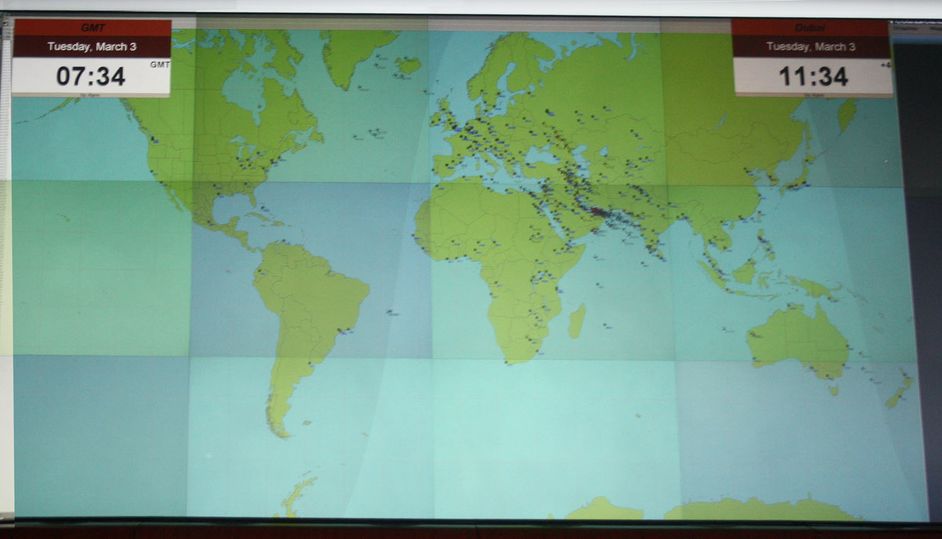Keeping an airline flying: inside Emirates' Network Control Centre

Keeping track of over 200 Emirates aircraft, 3,600 pilots and around 20,000 cabin crew members as they circle the globe is no easy task, but the responsibility falls to the airline's 500-strong Flight Operations team in Dubai.
Here, they deal with everything from the knock-on effects of adverse weather and delayed flights through to grounded aircraft, unplanned maintenance, last-minute gate changes and flight scheduling to quickly implement a Plan B, a Plan C or even a Plan D to minimise the disruption to passengers when things go wrong.
Australian Business Traveller was invited to Emirates HQ to take a rare look inside the Network Control Centre – a facility off-limits to members of the public, and even most of Emirates' own staff.
Front and centre of the delicate balancing act is Captain Alan Stealey, Emirates' Divisional Senior Vice President Flight Operations, who optimistically describes the job as "interesting, but challenging."
"We begin by working through the Operation Plan," Stealey tells us, "which helps (Emirates to) allocate our aircraft to specific flights, and to work out how many pilots we'll need. Then, we put a buffer in."
"75% of our passengers connect through Dubai, so what we need to do is make sure the aircraft coming into Dubai meet the aircraft going out of Dubai," continues Stealey.
Delayed flights: what's happening in the background
As any airline passenger can attest, delays can be brief at best or lengthy and frustrating at worst – but while passengers are busy downing another drink in the lounge, the Flight Ops team swings into overdrive – whether the aircraft is parked across the road from Network Control...
... or on the ground in Sydney, where Emirates' partner Qantas may be able to assist with parts for the A380 aircraft, which both airlines operate.
"If it's not a problem with the engines, there’s a good chance that Qantas will have a part available," Stealey shares, as Qantas and Emirates have different engines on their superjumbo fleets.
At the same time, another staff member checks how long the flight could reasonably be delayed before it has to be cancelled or an alternate crew called to the airport, or even flown in from a different port.
Meanwhile, a different team member in the scheduling department is busy minimising the impact to that aircraft's subsequent flights – investigating whether an alternate bird can be substituted to fill the gap, whether a number of flights can be tweaked or turnaround times adjusted to 'create' extra time in the schedule, or whether to simply run with the delay.
And then, there are the connecting passengers: if a delay is confirmed and they'll miss their onward flights, the airline's computers can flag this and allow staff to re-book the passengers onto something more suitable, with a new boarding pass waiting for them when they arrive in Dubai.
Early flights: they're not a bonus, says Stealey
Most people are chuffed when a flight reaches the gate ahead of schedule, as it means you'll be reaching your hotel room, the office or even your own bed earlier than planned.
But for Emirates, "an aircraft arriving early is just as disruptive as an aircraft arriving late," Stealey reveals to Australian Business Traveller.
"Early flights aren't a bonus. With connecting passengers and when working in a hub like Dubai, you need on-time performance on both departure and arrival, because everything is planned around that."
In conjunction with the software provided to pilots aboard the aircraft, Emirates can predict – to the nearest minute – exactly when an aircraft will land and can request pilots to speed up or dial back the throttle after considering the winds en route, the flight path, air traffic control restraints and the aircraft's actual and optimum speed.
Monitoring every Emirates flight in real time
A giant floor-to-ceiling screen takes up the centre of the room, allowing the Operations team to quickly spot where every Emirates aircraft is around the globe.
Up close we can watch the busy skies over the Middle East...
... or can glance towards Australia and New Zealand to see what's happening Down Under. During our visit, it became apparent that EK435 from Auckland to Brisbane would be touching down before the Auckland-Sydney flight, and considerably ahead of the Auckland-Melbourne service.
These screens are just 12 of many, with considerably more detailed information available to employees that require it – such as those who focus primarily on the happenings at Dubai International Airport, and in the airspace immediately surrounding it:
The screen above shows all airlines – not just Emirates – with the top section displaying the airport's two runways in green and black and the terminals in orange, while the bottom shows nearby aircraft already in the sky.
There are good days, and 2am phone call days...
Emirates counts its blessings having never sustained a fatal accident, yet Captain Stealey still receives the odd phone call in the wee hours of the morning.
"I’m the one responsible to the regulator for our flight operations, and while (an after-hours phone call) doesn't happen as often as it used to, it still does from time to time when somebody needs me to say 'okay'.
"If there's something which is unusual or something that needs my decision, they'll still call – because ultimately the responsibility is going to land in my lap," he adds.
Back in the Network Control Centre, the team continues monitoring the operation, but also keeps an eye on the international media for any signs of bad news – Sky News HD is pumped live to the big screen, while the BBC News homepage is open and set to 'auto-refresh' for good measure.
While the team is always ready to respond, on most days it's all about ensuring the airline's own safety, and once that has been achieved, making everything run to plan.
"On-time performance, a lack of aircraft going technical (unable to fly due to mechanical problems), and passengers making their connecting flights – that’s what I call a perfect day", Stealey concludes.
Stay behind the scenes:
- Fires, escape slides and champagne: training Emirates' cabin crew
- The inner workings of the Airbus A380 factory...
- Designing your own Boeing 787 at the Dreamliner Gallery
- Photos: the Airbus A380's secret hangout zone for cabin crew
- Photo tour: inside Boeing's 787 Dreamliner factory
Chris Chamberlin travelled to Dubai as guest of Emirates.
Follow Australian Business Traveller on Twitter: we're @AusBT









04 Oct 2011
Total posts 25
You get some good gigs Chris! Very jealous :-)
05 Dec 2013
Total posts 36
Brilliant article Chris, thank you! :)
Qantas - Qantas Frequent Flyer
01 Apr 2015
Total posts 55
A great piece, Chris! Enjoyed it very much. For those aviation geeks out there, I would highly recommend watching the TV series, Ultimate Airport Dubai. There are two seasons, both provide a fascinating insight into the workings of all areas of one of the world's fastest growing airports.
Qantas - Qantas Frequent Flyer
09 May 2013
Total posts 73
For the inner plane geek - see if you can get your hands on the TV show "Ultimate Airport Dubai". It's on National Geographic on Foxtel, can also find it on YouTube. They spend a lot of time inside the Network Control Centre.
Qantas - Qantas Frequent Flyer
20 Mar 2012
Total posts 116
Best article of the year. More of these please.
Virgin Australia - Velocity Rewards
18 Jun 2013
Total posts 24
I would be like a "pig in mud" inside an airline Operation/Network centre . It absolutely fascinates me.
18 Jul 2016
Total posts 2
What should a person study at university to get a job at a place like this?
I'm really curious and I've been looking all over google to find out but unfortunetely i haven't got any answers. I'm really into aviation and after watching Ultimate Airport Dubai i most defintely want to work there!
I'm thinking of studying an engineering degree inn university and then doing a masters in airport operations or something. But i dont know if that is a good idea or which engineering degree i should do. Any ideas?
18 Jul 2016
Total posts 2
at university*
Hi Guest, join in the discussion on Keeping an airline flying: inside Emirates' Network Control Centre